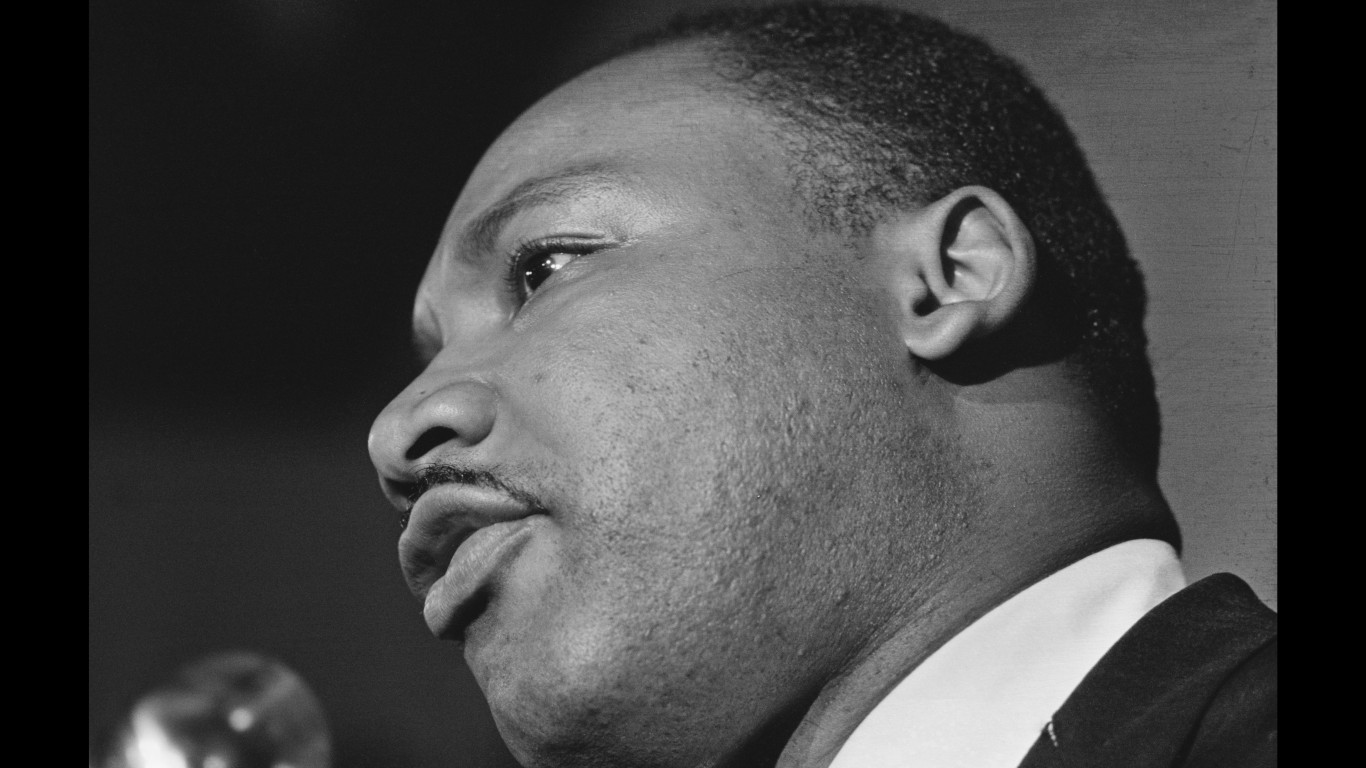
There are many different denominations, theologies, and preferences in American Christianity. Evangelicals are the largest group. There are different definitions as to what makes someone an evangelical Christian as opposed to a mainline Protestant. Poll numbers can skew widely based on the definition.
As many as 35% or as few as 6% of Americans would be considered as evangelical, depending on the poll. Public Religion Research Institute, a nonprofit research organization that studies religion, culture, and public policy, defines evangelicals as those who “self-identify as Protestant Christians who also identify as evangelical or born again.” According to PRRI, 15.3% of Americans identify as white evangelical Protestants.
According to the National Association of Evangelicals, evangelicals have four core tenets: They must believe that lives need to be transformed through a “born-again” experience; that it is important to spread the word of God to non-Christians through missionary and social-reform efforts; that the Bible is the ultimate authority; and that the death of Jesus on the cross made the redemption of humanity possible.
The percentage of evangelical Americans is steadily declining, but there are still a large number of people identifying as evangelical in every state. 24/7 Wall St. reviewed a survey from the Public Religion Research Institute of over 70,000 Americans to determine the most evangelical states.
Click here to see the most evangelical states.
Some surveys, including the one from PRRI, split black and white Protestants into separate categories before further classifying white as Protestants as either mainline or evangelical, as black and white Christians tend to have very different outlooks on religion and politics. For instance, white evangelicals hold a strong, reliable preference for Republican candidates. Black Protestants are much more likely to vote Democrat.
The percentage of Americans who identify as evangelical has declined in recent years, as has the rate of religiously affiliated Americans as a whole. Some 15.3% of Americans identified as a white evangelical Protestant in 2017, a 2.2 percentage point decrease from 2013, the first year the survey was conducted. The rate of religiously unaffiliated people grew 4.2 percentage points to 25.3% in 2017.
To determine the most evangelical states in the country, 24/7 Wall St. reviewed the 2017 American Values Atlas from the nonprofit research organization Public Religion Research Institute. States were ranked by the percentage of respondents who self-identified as a white evangelical Protestant in a phone interview. For each state, we reviewed the change in the percentage of evangelicals, most common religion, and fastest growing religion with data from PRRI from PRRI. The median annual household income came from the U.S. Census Bureau’s American Community Survey. Hawaii and Alaska were not included in the initial 2013 survey, so there is no data for the 2013 change in evangelical percentage in those two states. PRRI bears no responsibility for the analyses or interpretations of the data presented here.

50. Utah
> Pct. evangelical: 3%
> 2013-2017 change, evangelical: +0 percentage points
> Most common religion: Mormon
> Fastest growing religion: Unaffiliated, +8%
> Median household income: $62,518
[in-text-ad]

49. Hawaii
> Pct. evangelical: 5%
> 2013-2017 change, evangelical: n/a
> Most common religion: Unaffiliated
> Fastest growing religion: n/a
> Median household income: $71,977

48. New Jersey
> Pct. evangelical: 5%
> 2013-2017 change, evangelical: +0 percentage points
> Most common religion: Unaffiliated
> Fastest growing religion: Unaffiliated, +3%
> Median household income: $73,702

47. New York
> Pct. evangelical: 5%
> 2013-2017 change, evangelical: +0 percentage points
> Most common religion: Unaffiliated
> Fastest growing religion: Unaffiliated, +3%
> Median household income: $60,741
[in-text-ad-2]

46. Connecticut
> Pct. evangelical: 6%
> 2013-2017 change, evangelical: +1 percentage point
> Most common religion: Unaffiliated
> Fastest growing religion: Unaffiliated, +8%
> Median household income: $71,755

45. Massachusetts
> Pct. evangelical: 6%
> 2013-2017 change, evangelical: +2 percentage points
> Most common religion: Unaffiliated
> Fastest growing religion: Unaffiliated, +5%
> Median household income: $70,954
[in-text-ad]
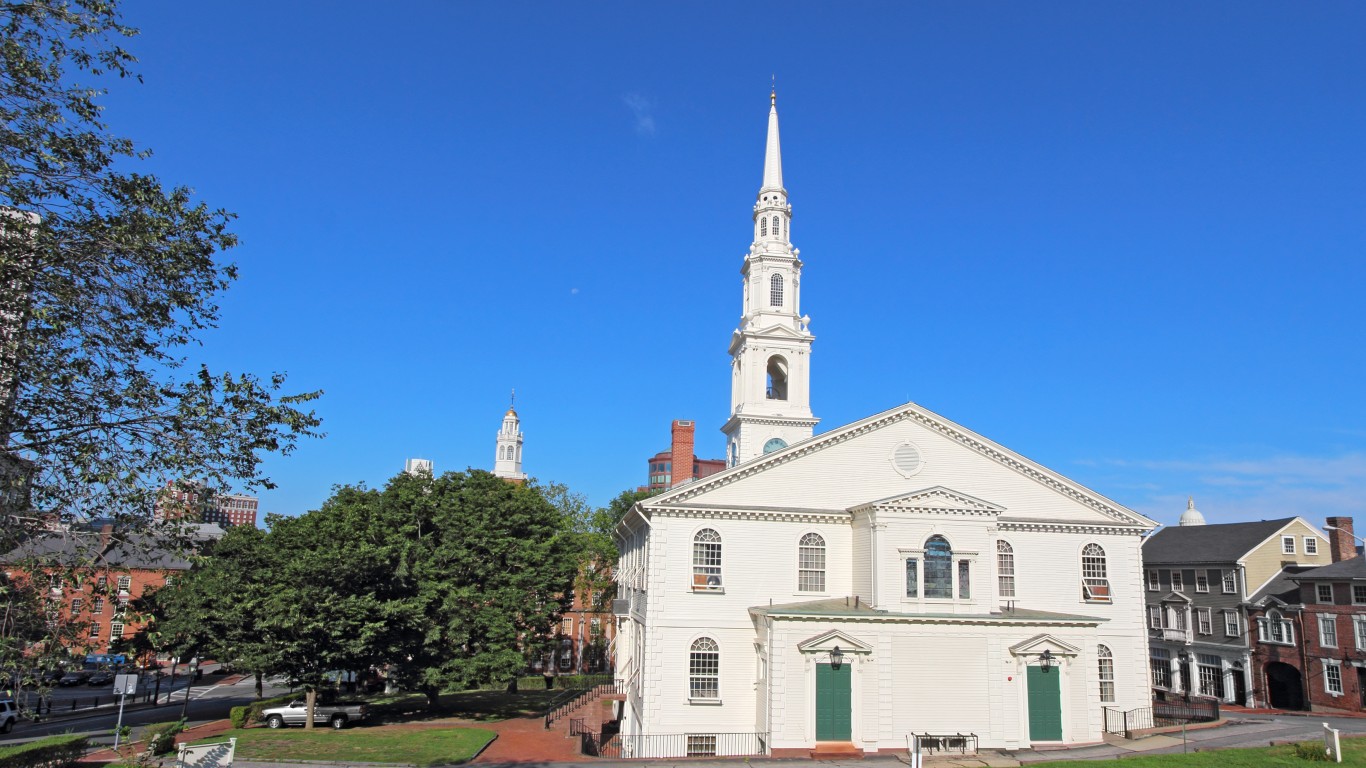
44. Rhode Island
> Pct. evangelical: 6%
> 2013-2017 change, evangelical: +3 percentage points
> Most common religion: White Catholic
> Fastest growing religion: Unaffiliated, +5%
> Median household income: $58,387

43. California
> Pct. evangelical: 7%
> 2013-2017 change, evangelical: -1 percentage point
> Most common religion: Unaffiliated
> Fastest growing religion: Unaffiliated, +7%
> Median household income: $63,783

42. Nevada
> Pct. evangelical: 7%
> 2013-2017 change, evangelical: -5 percentage points
> Most common religion: Unaffiliated
> Fastest growing religion: Unaffiliated, +12%
> Median household income: $53,094
[in-text-ad-2]

41. Vermont
> Pct. evangelical: 8%
> 2013-2017 change, evangelical: -3 percentage points
> Most common religion: Unaffiliated
> Fastest growing religion: Unaffiliated, +12%
> Median household income: $56,104

40. Maryland
> Pct. evangelical: 9%
> 2013-2017 change, evangelical: -1 percentage point
> Most common religion: Unaffiliated
> Fastest growing religion: Unaffiliated, +5%
> Median household income: $76,067
[in-text-ad]

39. New Hampshire
> Pct. evangelical: 10%
> 2013-2017 change, evangelical: +1 percentage point
> Most common religion: Unaffiliated
> Fastest growing religion: Unaffiliated, +4%
> Median household income: $68,485
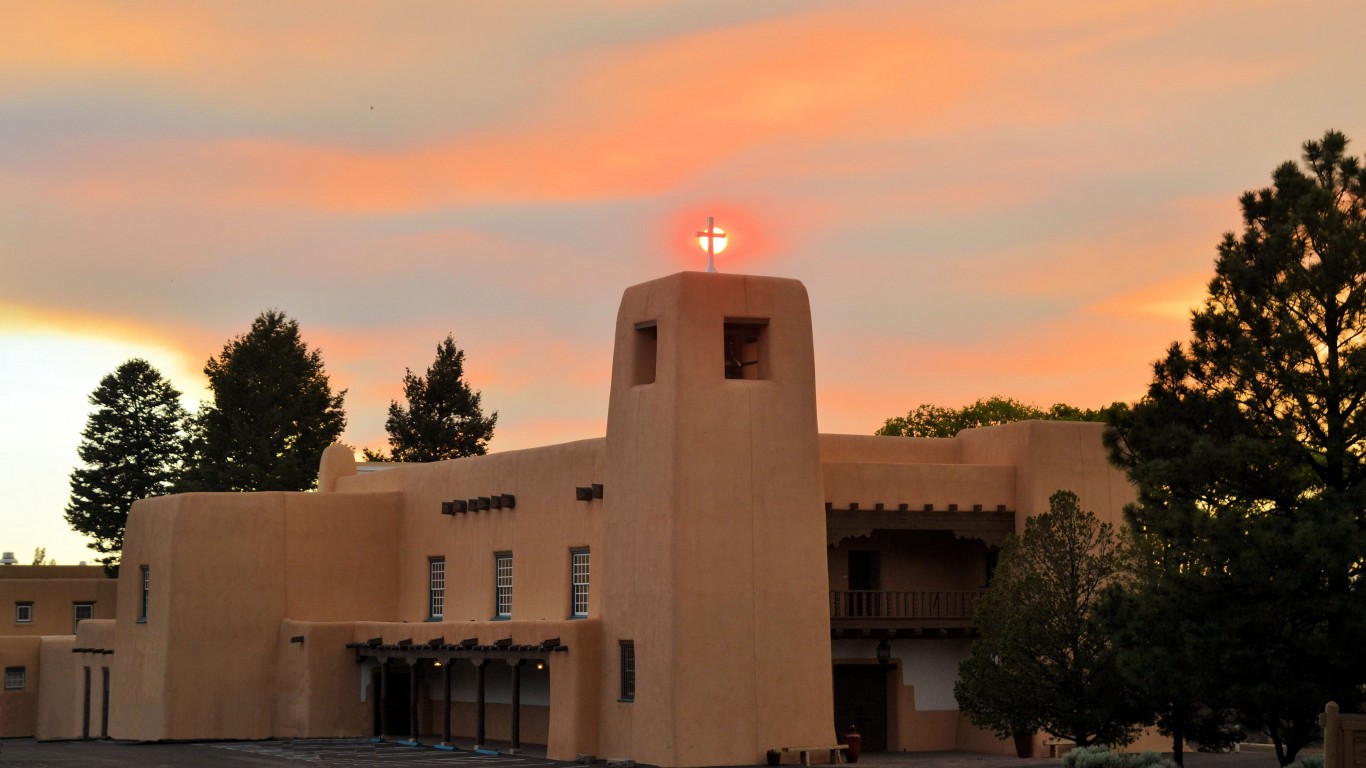
38. New Mexico
> Pct. evangelical: 10%
> 2013-2017 change, evangelical: -2 percentage points
> Most common religion: Unaffiliated
> Fastest growing religion: Unaffiliated, +4%
> Median household income: $45,674

37. Delaware
> Pct. evangelical: 11%
> 2013-2017 change, evangelical: -4 percentage points
> Most common religion: Unaffiliated
> Fastest growing religion: Hispanic Protestant, +4%
> Median household income: $61,017
[in-text-ad-2]
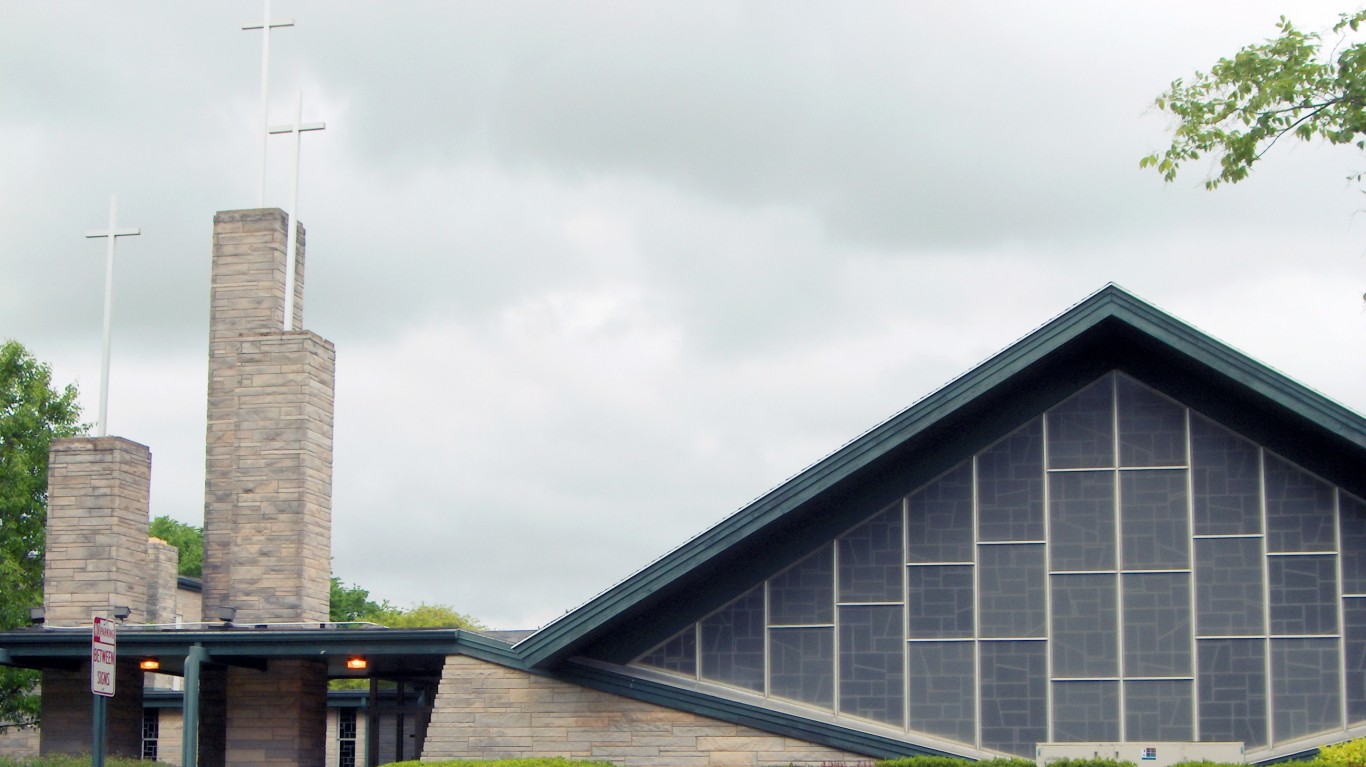
36. Illinois
> Pct. evangelical: 11%
> 2013-2017 change, evangelical: -1 percentage point
> Most common religion: Unaffiliated
> Fastest growing religion: Unaffiliated, +3%
> Median household income: $59,196

35. Idaho
> Pct. evangelical: 13%
> 2013-2017 change, evangelical: +1 percentage point
> Most common religion: Unaffiliated
> Fastest growing religion: Unaffiliated, +7%
> Median household income: $49,174
[in-text-ad]

34. Arizona
> Pct. evangelical: 14%
> 2013-2017 change, evangelical: +1 percentage point
> Most common religion: Unaffiliated
> Fastest growing religion: Unaffiliated, +2%
> Median household income: $51,340
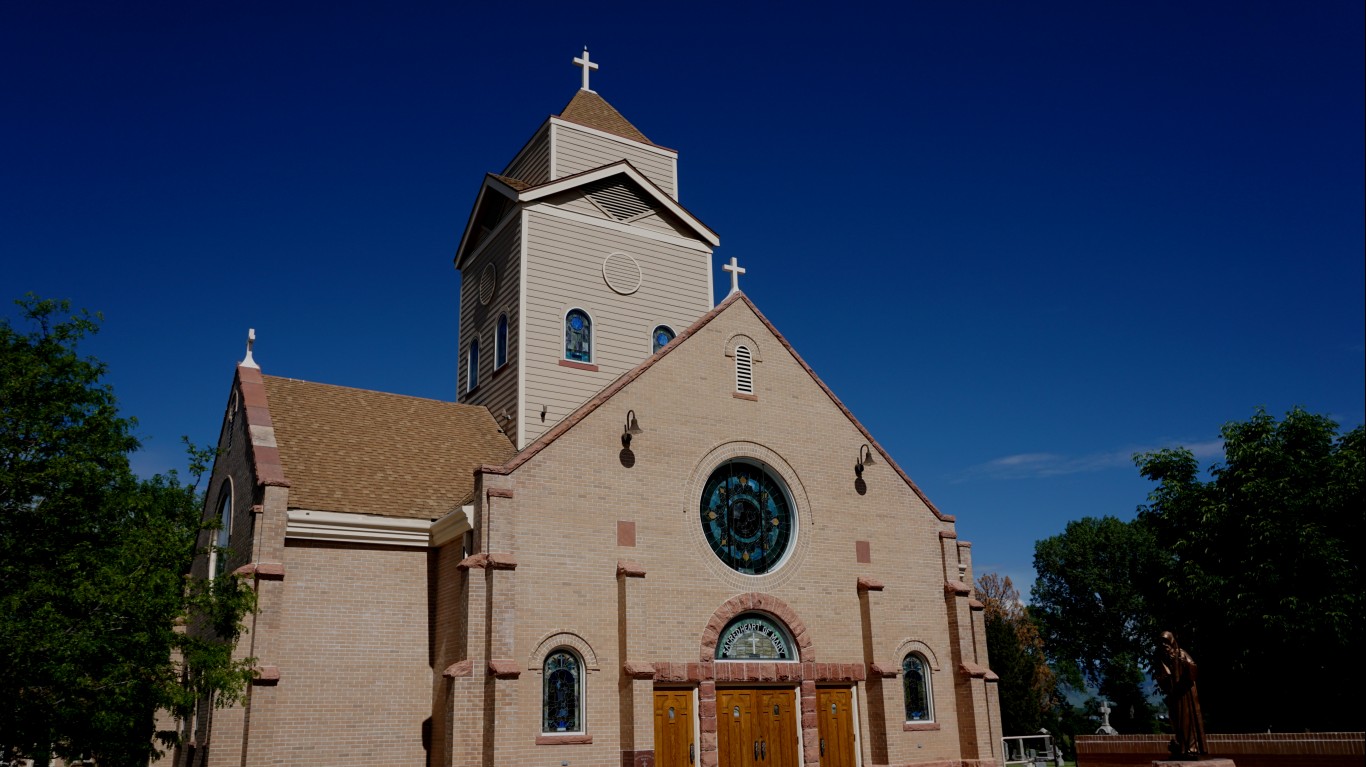
33. Colorado
> Pct. evangelical: 14%
> 2013-2017 change, evangelical: -1 percentage point
> Most common religion: Unaffiliated
> Fastest growing religion: Unaffiliated, +3%
> Median household income: $62,520

32. Florida
> Pct. evangelical: 14%
> 2013-2017 change, evangelical: -2 percentage points
> Most common religion: Unaffiliated
> Fastest growing religion: Unaffiliated, +3%
> Median household income: $48,900
[in-text-ad-2]
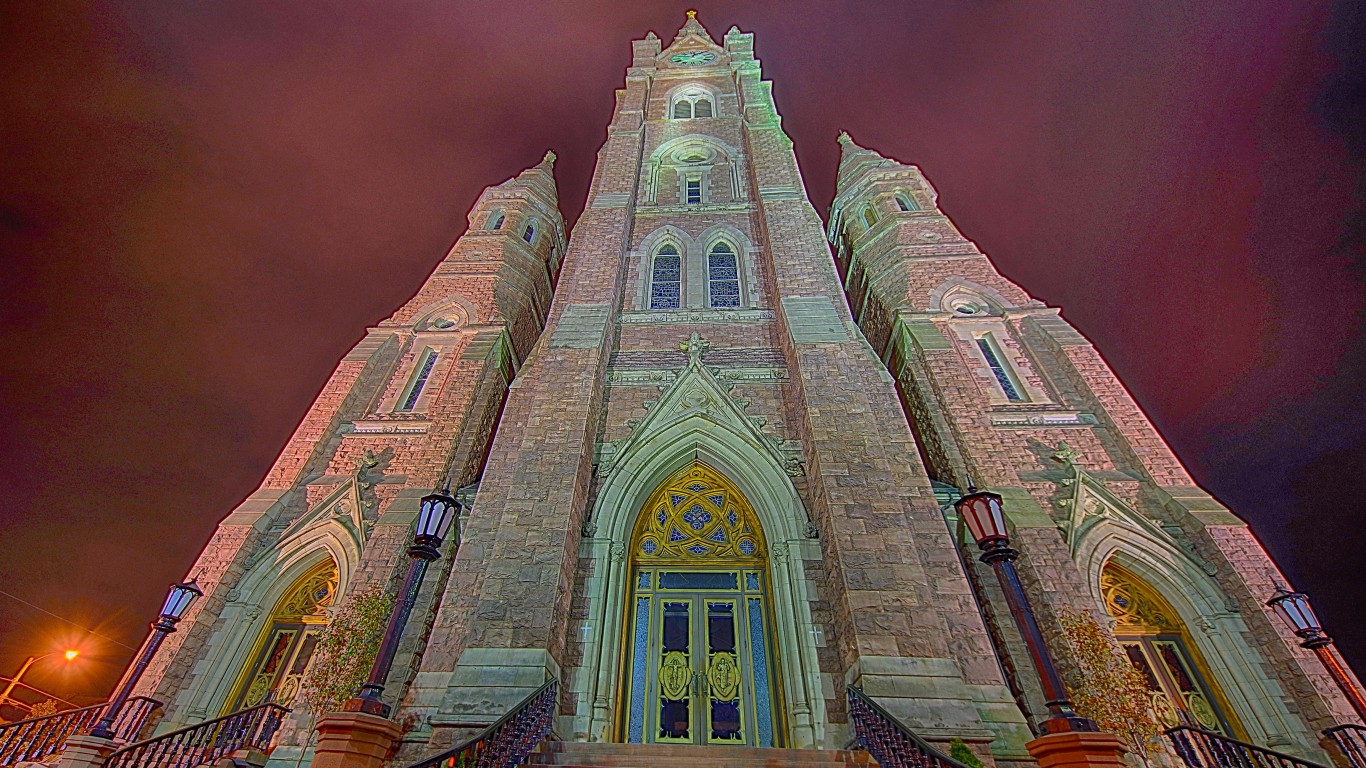
31. Pennsylvania
> Pct. evangelical: 14%
> 2013-2017 change, evangelical: -3 percentage points
> Most common religion: Unaffiliated
> Fastest growing religion: Unaffiliated, +3%
> Median household income: $54,895

30. Washington
> Pct. evangelical: 14%
> 2013-2017 change, evangelical: -5 percentage points
> Most common religion: Unaffiliated
> Fastest growing religion: Unaffiliated, +6%
> Median household income: $62,848
[in-text-ad]

29. Maine
> Pct. evangelical: 15%
> 2013-2017 change, evangelical: +0 percentage points
> Most common religion: Unaffiliated
> Fastest growing religion: Black Protestant, +2%
> Median household income: $50,826
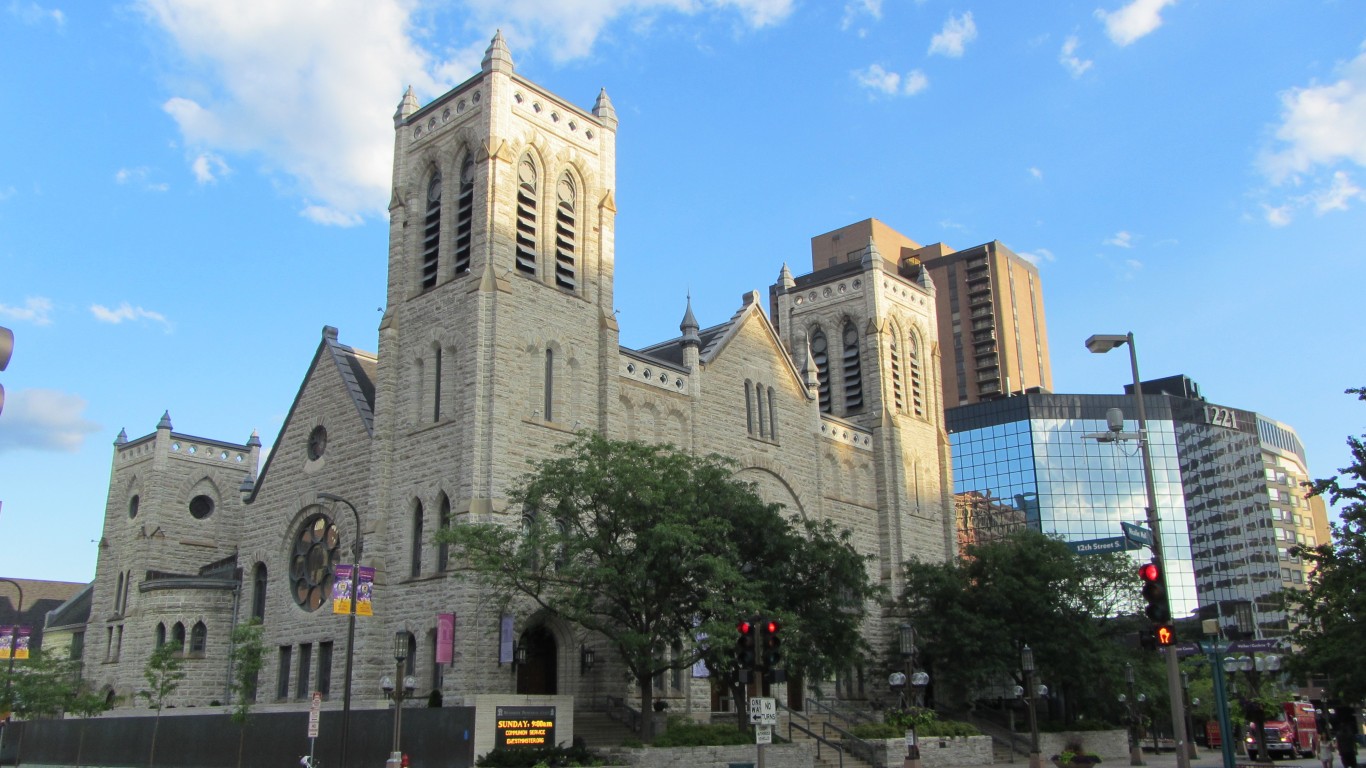
28. Minnesota
> Pct. evangelical: 15%
> 2013-2017 change, evangelical: -3 percentage points
> Most common religion: Unaffiliated
> Fastest growing religion: Unaffiliated, +4%
> Median household income: $63,217

27. Wisconsin
> Pct. evangelical: 15%
> 2013-2017 change, evangelical: -1 percentage point
> Most common religion: Unaffiliated
> Fastest growing religion: Unaffiliated, +1%
> Median household income: $54,610
[in-text-ad-2]

26. Michigan
> Pct. evangelical: 16%
> 2013-2017 change, evangelical: -4 percentage points
> Most common religion: Unaffiliated
> Fastest growing religion: Unaffiliated, +4%
> Median household income: $50,803

25. Texas
> Pct. evangelical: 16%
> 2013-2017 change, evangelical: -3 percentage points
> Most common religion: Unaffiliated
> Fastest growing religion: Unaffiliated, +4%
> Median household income: $54,727
[in-text-ad]

24. Wyoming
> Pct. evangelical: 16%
> 2013-2017 change, evangelical: +1 percentage point
> Most common religion: Unaffiliated
> Fastest growing religion: Hispanic Protestant / White Catholic, +3%
> Median household income: $59,143

23. Montana
> Pct. evangelical: 17%
> 2013-2017 change, evangelical: -7 percentage points
> Most common religion: Unaffiliated
> Fastest growing religion: Unaffiliated, +13%
> Median household income: $48,380

22. Oregon
> Pct. evangelical: 17%
> 2013-2017 change, evangelical: -3 percentage points
> Most common religion: Unaffiliated
> Fastest growing religion: Hispanic Catholic, +4%
> Median household income: $53,270
[in-text-ad-2]

21. South Dakota
> Pct. evangelical: 17%
> 2013-2017 change, evangelical: -9 percentage points
> Most common religion: White Mainline Protestant
> Fastest growing religion: Other Non-White Protestant, +4%
> Median household income: $52,078

20. Alaska
> Pct. evangelical: 18%
> 2013-2017 change, evangelical: n/a
> Most common religion: Unaffiliated
> Fastest growing religion: n/a
> Median household income: $74,444
[in-text-ad]

19. Louisiana
> Pct. evangelical: 18%
> 2013-2017 change, evangelical: -1 percentage point
> Most common religion: Black Protestant
> Fastest growing religion: Unaffiliated, +4%
> Median household income: $45,652

18. Nebraska
> Pct. evangelical: 18%
> 2013-2017 change, evangelical: -7 percentage points
> Most common religion: Unaffiliated
> Fastest growing religion: Unaffiliated, +3%
> Median household income: $54,384

17. Ohio
> Pct. evangelical: 19%
> 2013-2017 change, evangelical: -2 percentage points
> Most common religion: Unaffiliated
> Fastest growing religion: Unaffiliated, +3%
> Median household income: $50,674
[in-text-ad-2]
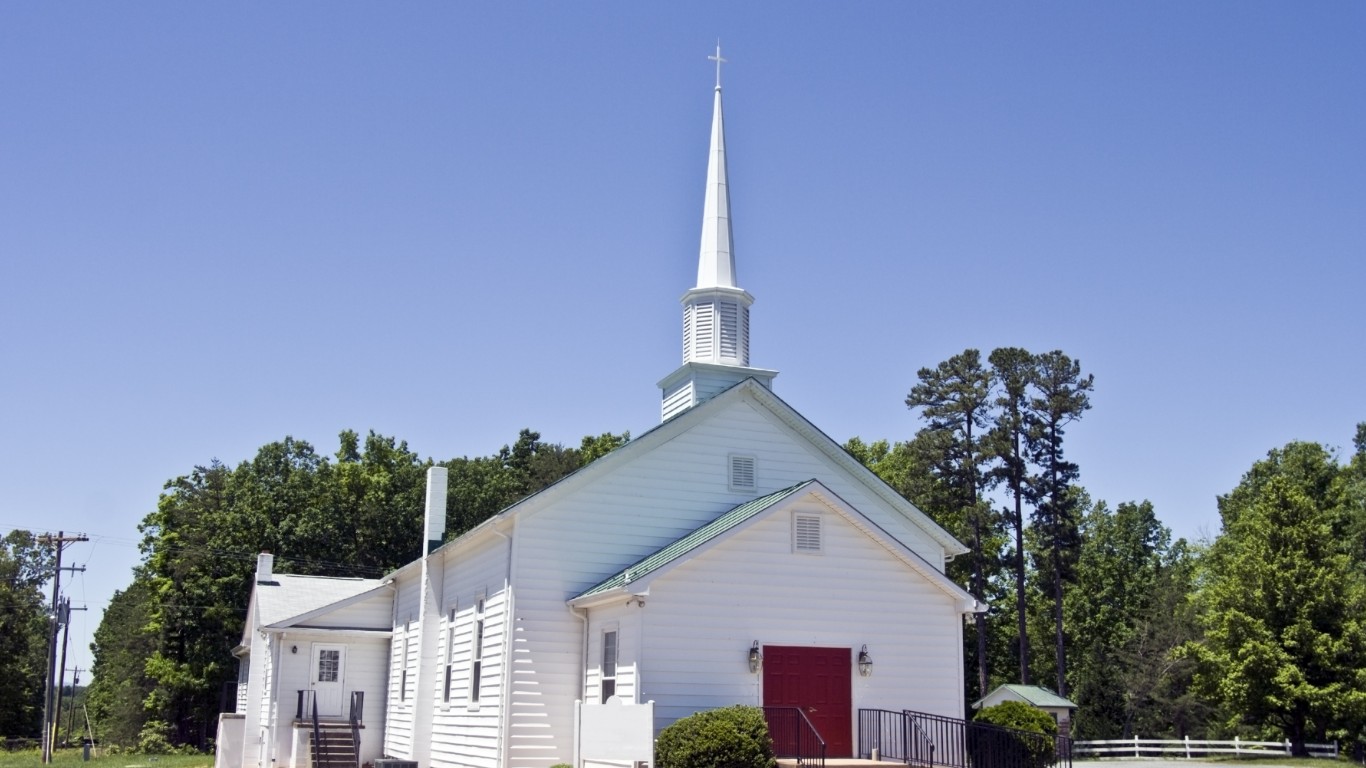
16. Virginia
> Pct. evangelical: 20%
> 2013-2017 change, evangelical: +1 percentage point
> Most common religion: Unaffiliated
> Fastest growing religion: Unaffiliated, +3%
> Median household income: $66,149
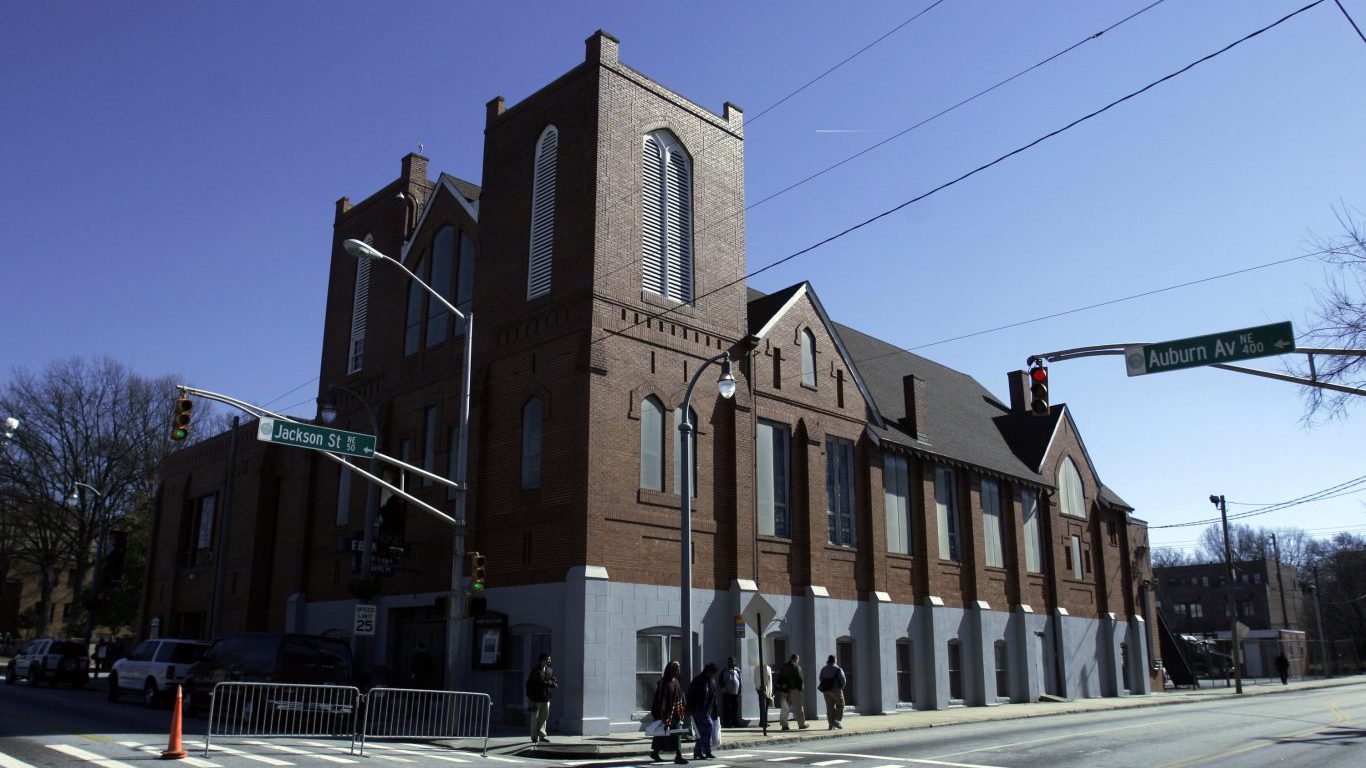
15. Georgia
> Pct. evangelical: 21%
> 2013-2017 change, evangelical: -3 percentage points
> Most common religion: Unaffiliated
> Fastest growing religion: Unaffiliated, +6%
> Median household income: $51,037
[in-text-ad]

14. North Dakota
> Pct. evangelical: 21%
> 2013-2017 change, evangelical: -1 percentage point
> Most common religion: White Mainline Protestant / Unaffiliated / White Evangelical Protestant
> Fastest growing religion: Unaffiliated, +12%
> Median household income: $59,114

13. Iowa
> Pct. evangelical: 23%
> 2013-2017 change, evangelical: +0 percentage points
> Most common religion: Unaffiliated
> Fastest growing religion: Unaffiliated, +6%
> Median household income: $54,570

12. Missouri
> Pct. evangelical: 23%
> 2013-2017 change, evangelical: -4 percentage points
> Most common religion: White Evangelical Protestant
> Fastest growing religion: Unaffiliated, +2%
> Median household income: $49,593
[in-text-ad-2]

11. Indiana
> Pct. evangelical: 24%
> 2013-2017 change, evangelical: -4 percentage points
> Most common religion: Unaffiliated
> Fastest growing religion: Unaffiliated, +5%
> Median household income: $50,433
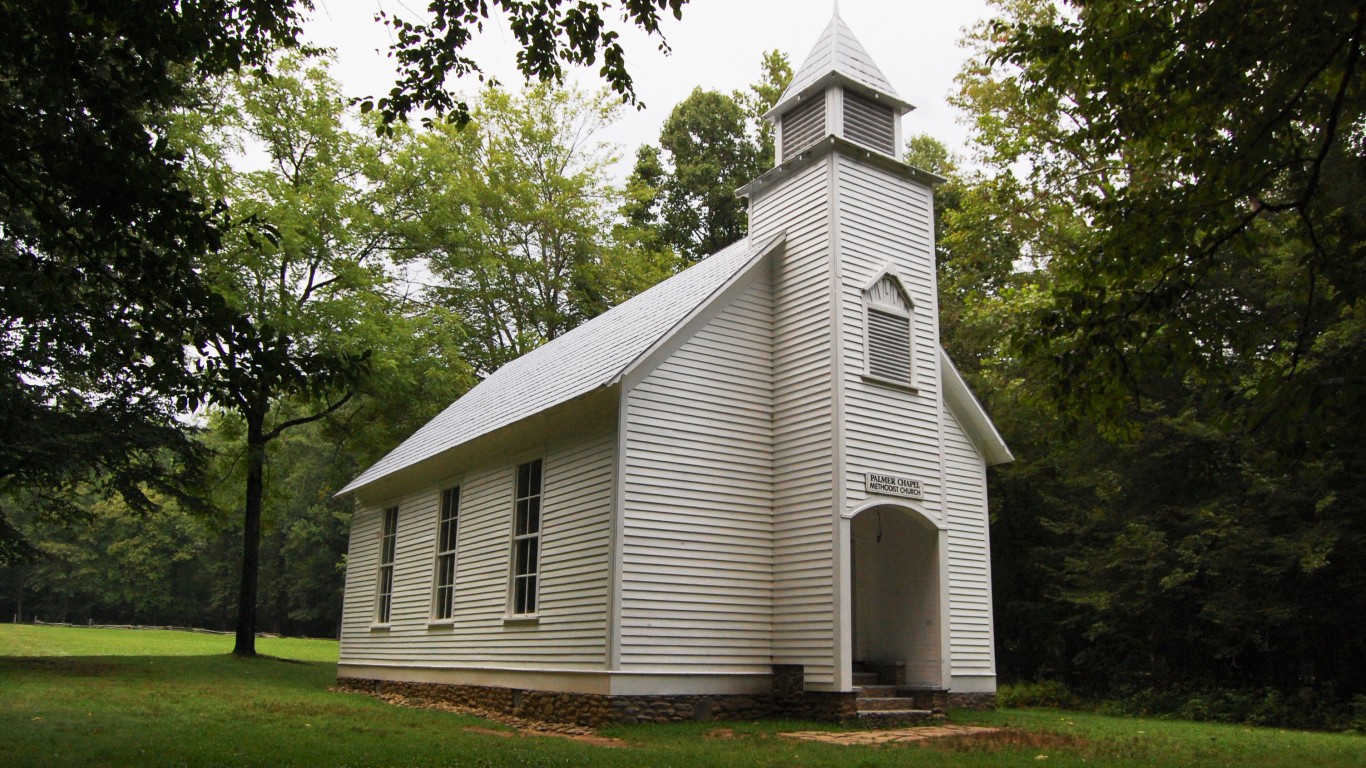
10. North Carolina
> Pct. evangelical: 24%
> 2013-2017 change, evangelical: -6 percentage points
> Most common religion: White Evangelical Protestant
> Fastest growing religion: Unaffiliated, +4%
> Median household income: $48,256
[in-text-ad]
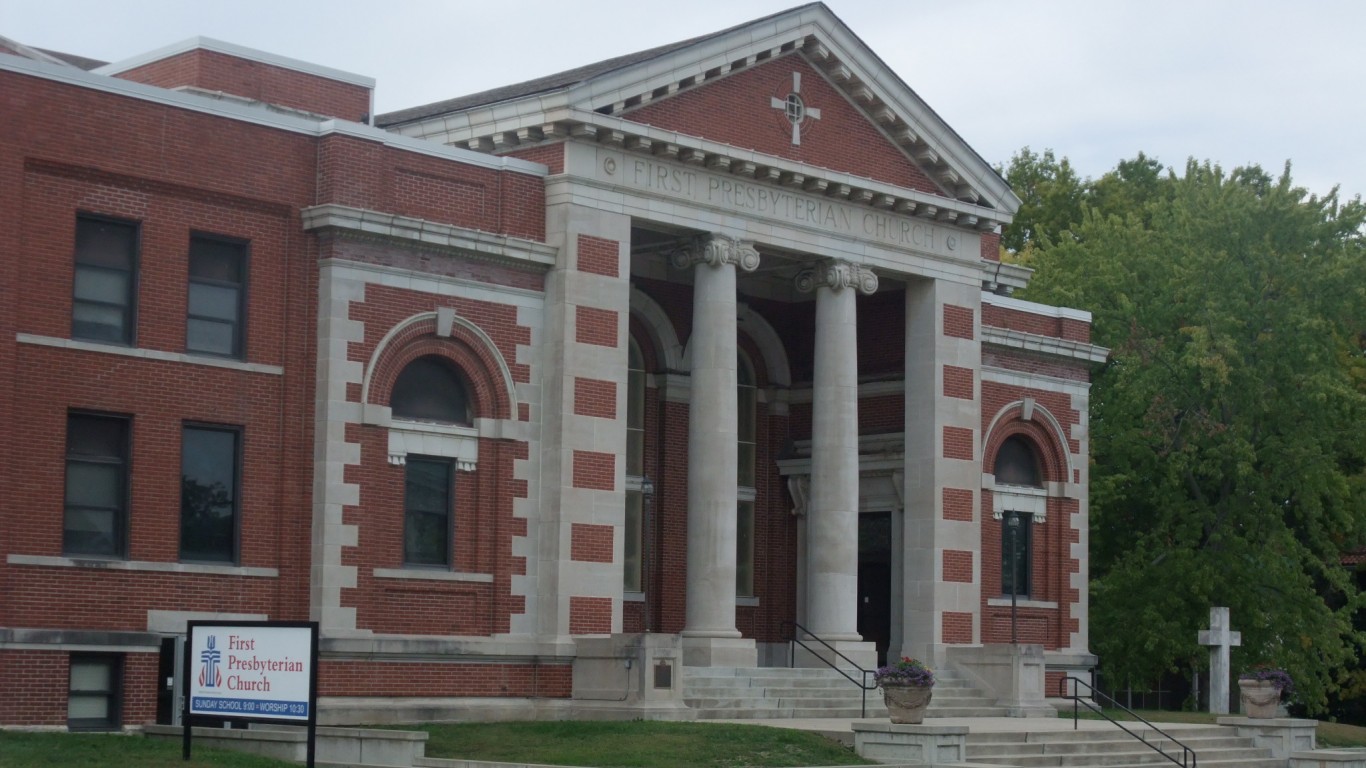
9. Kansas
> Pct. evangelical: 25%
> 2013-2017 change, evangelical: +0 percentage points
> Most common religion: White Evangelical Protestant
> Fastest growing religion: Unaffiliated, +4%
> Median household income: $53,571

8. South Carolina
> Pct. evangelical: 25%
> 2013-2017 change, evangelical: -2 percentage points
> Most common religion: White Evangelical Protestant
> Fastest growing religion: Unaffiliated, +3%
> Median household income: $46,898
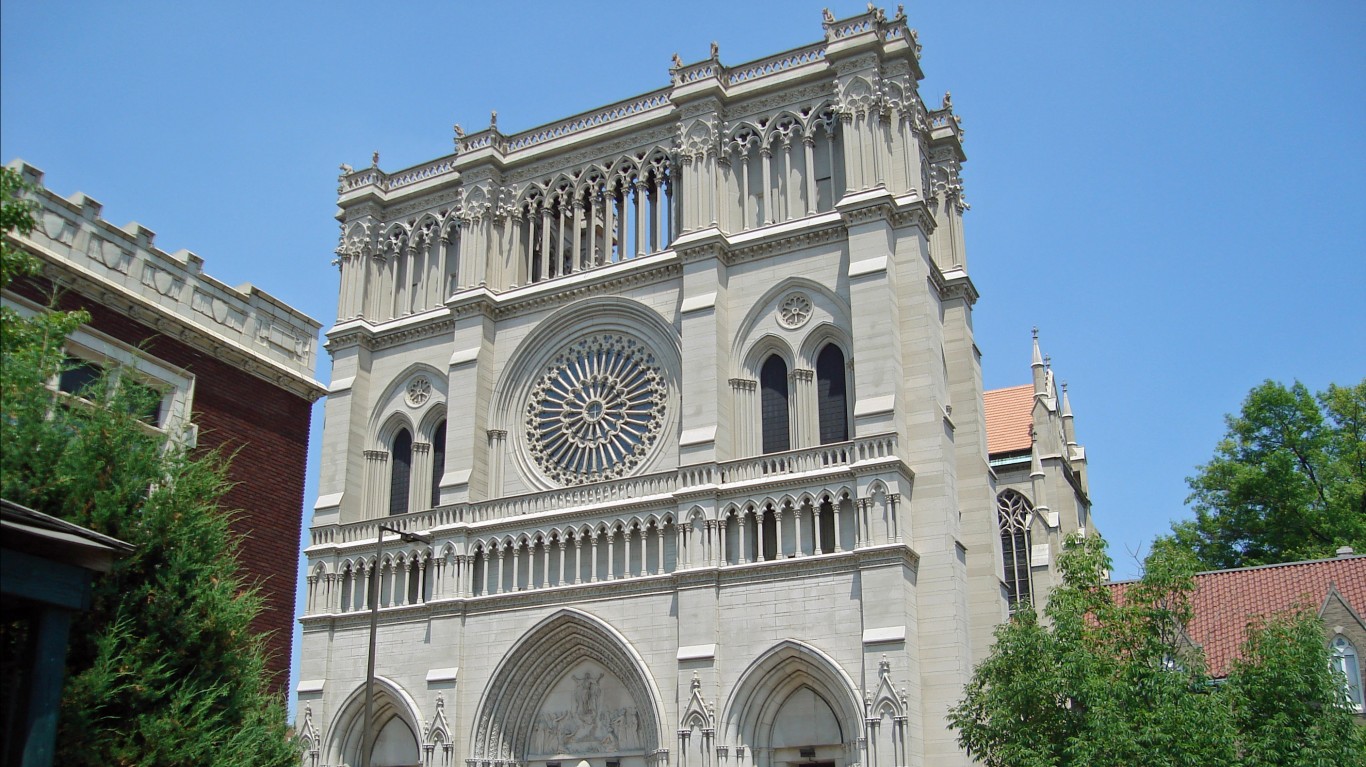
7. Kentucky
> Pct. evangelical: 28%
> 2013-2017 change, evangelical: -4 percentage points
> Most common religion: White Evangelical Protestant
> Fastest growing religion: Unaffiliated, +3%
> Median household income: $44,811
[in-text-ad-2]
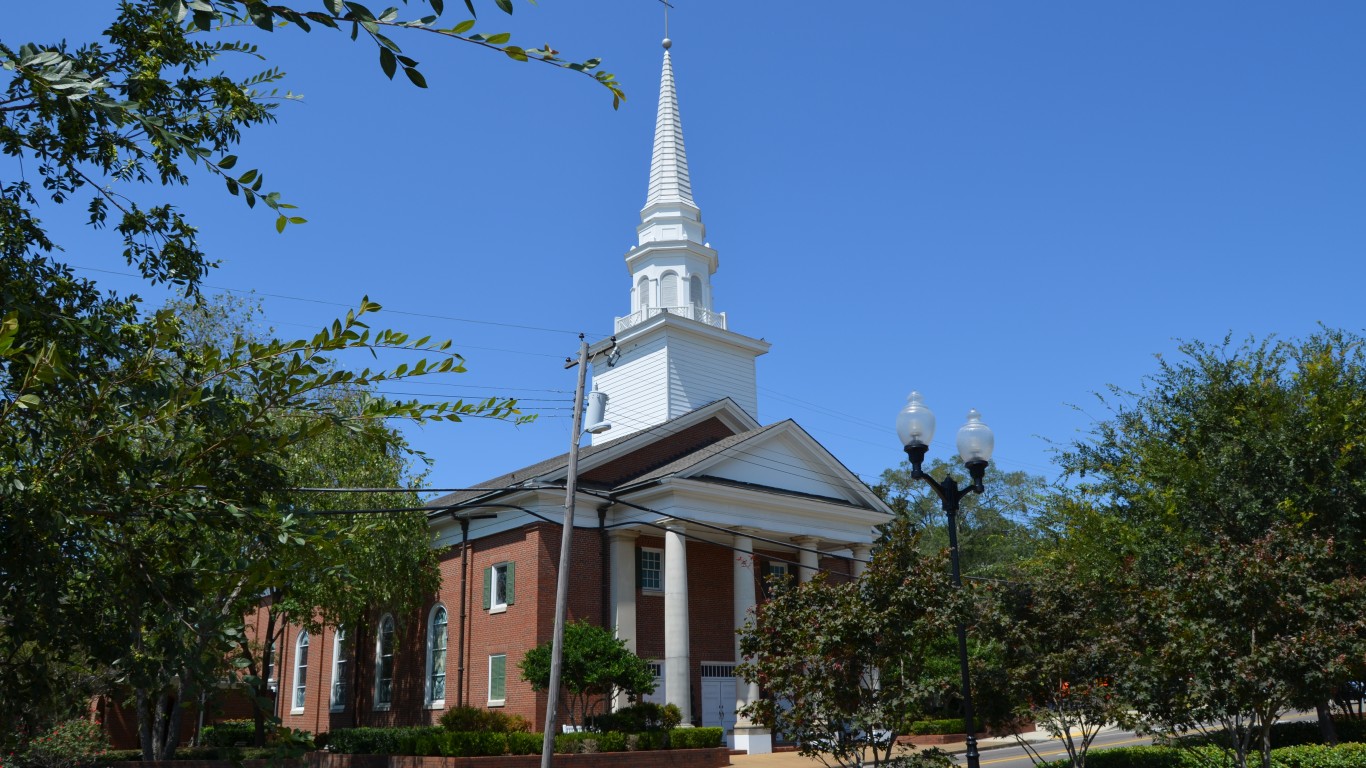
6. Mississippi
> Pct. evangelical: 29%
> 2013-2017 change, evangelical: -3 percentage points
> Most common religion: White Evangelical Protestant
> Fastest growing religion: Unaffiliated, +6%
> Median household income: $40,528
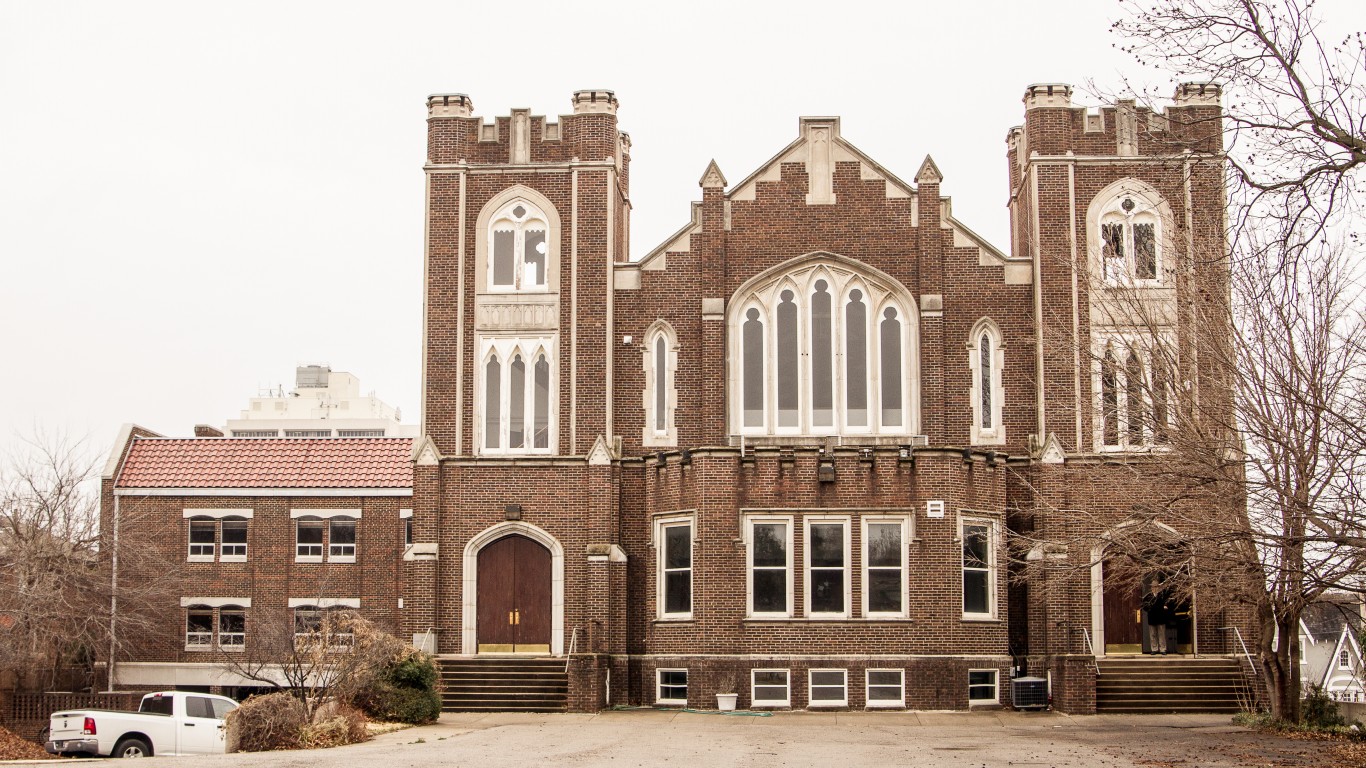
5. Oklahoma
> Pct. evangelical: 29%
> 2013-2017 change, evangelical: -2 percentage points
> Most common religion: White Evangelical Protestant
> Fastest growing religion: White Mainline Protestant, +4%
> Median household income: $48,038
[in-text-ad]
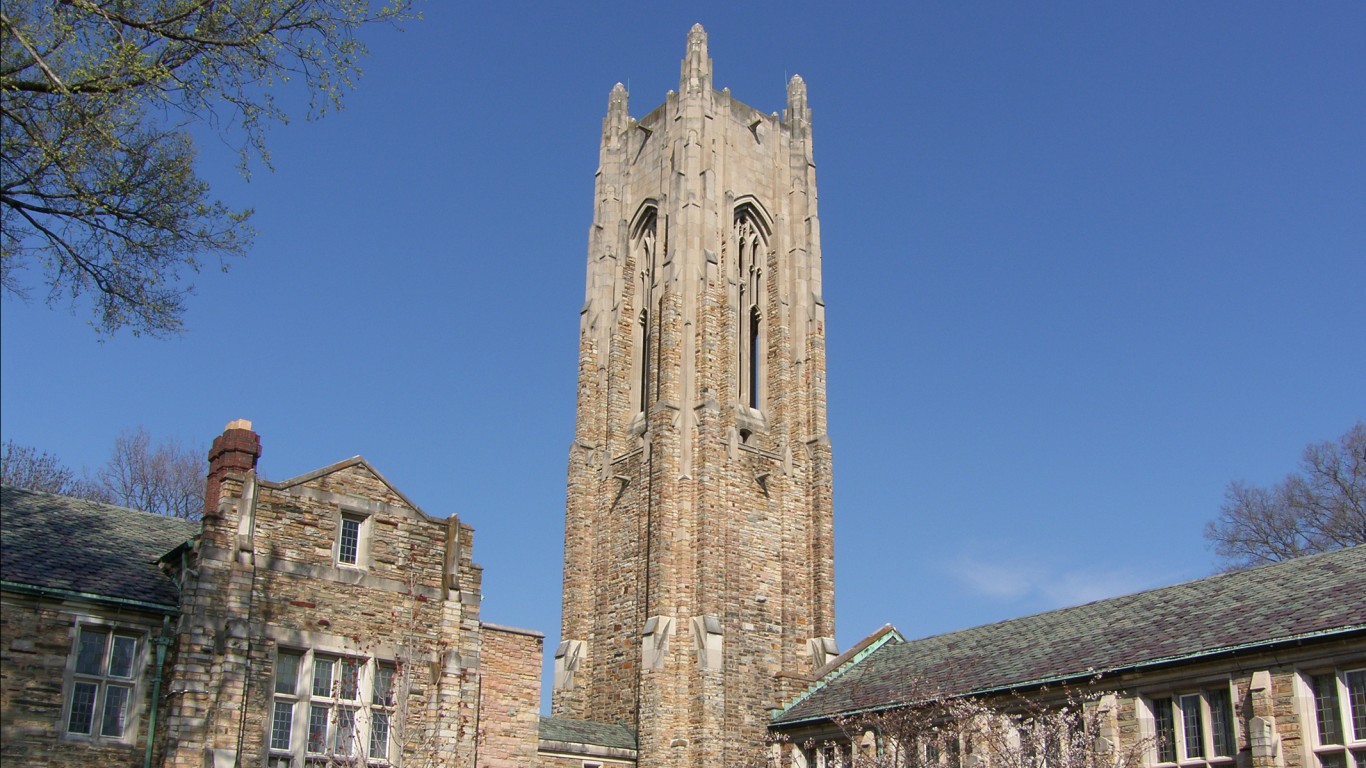
4. Tennessee
> Pct. evangelical: 33%
> 2013-2017 change, evangelical: -4 percentage points
> Most common religion: White Evangelical Protestant
> Fastest growing religion: Unaffiliated, +3%
> Median household income: $46,574

3. Alabama
> Pct. evangelical: 34%
> 2013-2017 change, evangelical: -2 percentage points
> Most common religion: White Evangelical Protestant
> Fastest growing religion: Unaffiliated, +2%
> Median household income: $44,758

2. Arkansas
> Pct. evangelical: 34%
> 2013-2017 change, evangelical: -2 percentage points
> Most common religion: White Evangelical Protestant
> Fastest growing religion: Unaffiliated, +5%
> Median household income: $42,336
[in-text-ad-2]

1. West Virginia
> Pct. evangelical: 37%
> 2013-2017 change, evangelical: -5 percentage points
> Most common religion: White Evangelical Protestant
> Fastest growing religion: White Mainline Protestant, +5%
> Median household income: $42,644
Credit card companies are handing out rewards and benefits to win the best customers. A good cash back card can be worth thousands of dollars a year in free money, not to mention other perks like travel, insurance, and access to fancy lounges. See our top picks for the best credit cards today. You won’t want to miss some of these offers.
Flywheel Publishing has partnered with CardRatings for our coverage of credit card products. Flywheel Publishing and CardRatings may receive a commission from card issuers.
Thank you for reading! Have some feedback for us?
Contact the 24/7 Wall St. editorial team.
 24/7 Wall St.
24/7 Wall St. 24/7 Wall St.
24/7 Wall St. 24/7 Wall St.
24/7 Wall St. 24/7 Wall St.
24/7 Wall St. 24/7 Wall St.
24/7 Wall St. 24/7 Wall St.
24/7 Wall St.

